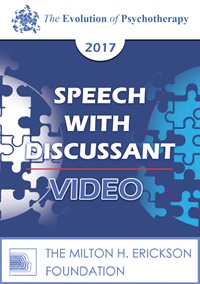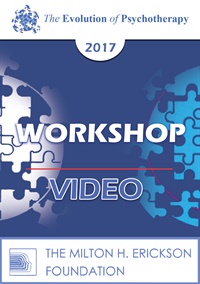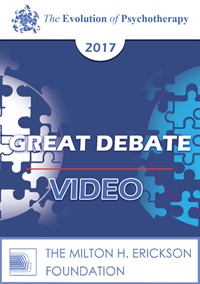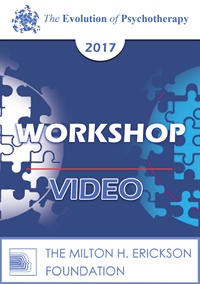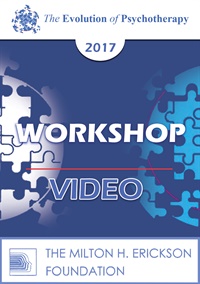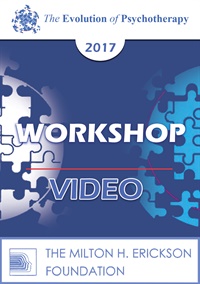Credit available - Click Here for more information
- Average Rating:
- Not yet rated
- Topic Areas:
- Speeches with Discussants | Trauma | Somatic Experiences | Memory | Continuing Education | Psychotherapy
- Bundle(s):
- EP17 Video Stream Build a Bundle | Learning Track - EP17 Trauma Stream
- Categories:
- Evolution of Psychotherapy | Evolution of Psychotherapy 2017 | Evolution of Psychotherapy Trauma Learning Track | Online Continuing Education
- Faculty:
- Peter Levine, PhD | Bessel van der Kolk, MD
- Course Levels:
- Master Degree or Higher in Health-Related Field
- Duration:
- 1:23:22
- Format:
- Audio and Video
- Original Program Date:
- Dec 16, 2017
- Short Description:
- There is tremendous confusion in work with traumatic memories, often leaving clients and their therapists confused and insecure. In this lecture we will discuss the different types of memory (both explicit/conscious & implicit/unconscious) in resolving traumatic reactions, while avoiding the creation of "false memories."
- Price:
-
Sale is $29.00
price reduced from Base Price - $59.00

- Average Rating:
- Not yet rated
- Topic Areas:
- Post-Traumatic Stress Disorder (PTSD) | Topical Panels | Trauma | Psychotherapy
- Bundle(s):
- EP17 Audio Streaming Build a Bundle | Learning Track - EP17 Trauma Download
- Categories:
- Evolution of Psychotherapy | Evolution of Psychotherapy 2017 | Evolution of Psychotherapy Trauma Learning Track
- Faculty:
- Peter Levine, PhD | Bill O'Hanlon, MS | Bessel van der Kolk, MD
- Duration:
- 1:00:15
- Format:
- Audio Only
- Original Program Date:
- Dec 15, 2017
- Short Description:
- Every therapist needs a method to work with posttraumatic stress disorder. Fundamental techniques will be discussed. Neurological considerations will be offered.
- Price:
- $15.00 - Base Price
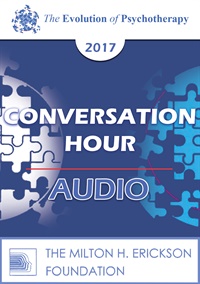
- Average Rating:
- Not yet rated
- Topic Areas:
- Conversation Hours | Post-Traumatic Stress Disorder (PTSD) | Trauma | Neuroscience | Psychotherapy
- Bundle(s):
- EP17 Audio Streaming Build a Bundle | Learning Track - EP17 Trauma Download
- Categories:
- Evolution of Psychotherapy | Evolution of Psychotherapy 2017 | Evolution of Psychotherapy Trauma Learning Track
- Faculty:
- Bessel van der Kolk, MD
- Duration:
- 48:07
- Format:
- Audio Only
- Original Program Date:
- Dec 15, 2017
- Short Description:
- Attendees will learn about the fundamentals of trauma and the underlying neuroscience. Educational Objectives: Describe the common components of posttraumatic stress disorder. Describe three elements of the basic neuroscience of trauma.
- Price:
- $15.00 - Base Price
Credit available - Click Here for more information
- Average Rating:
- Not yet rated
- Topic Areas:
- Workshops | Post-Traumatic Stress Disorder (PTSD) | Trauma | Psychotherapy
- Bundle(s):
- EP17 Video Stream Build a Bundle | Learning Track - EP17 Trauma Stream
- Categories:
- Evolution of Psychotherapy | Evolution of Psychotherapy 2017 | Evolution of Psychotherapy Trauma Learning Track | Online Continuing Education
- Faculty:
- Bessel van der Kolk, MD
- Course Levels:
- Master Degree or Higher in Health-Related Field
- Duration:
- 2:17:19
- Format:
- Audio and Video
- Original Program Date:
- Dec 14, 2017
- Short Description:
- Trauma is a fact of life. Veterans and their families deal with the painful aftermath of combat; one in five Americans has been molested; one in four grew up with alcoholics; one in three couples have engaged in physical violence. Dr. Bessel van der Kolk, one of the world’s foremost experts on trauma, has spent over three decades working with survivors. He explores innovative treatments—from neurofeedback and meditation to sports, drama, and yoga—that offer new paths to recovery by activating the brain’s natural neuroplasticity.
- Price:
-
Sale is $29.00
price reduced from Base Price - $59.00
Credit available - Click Here for more information
- Average Rating:
- Not yet rated
- Topic Areas:
- Great Debates | Post-Traumatic Stress Disorder (PTSD) | Trauma | Neurobiology | Psychotherapy
- Bundle(s):
- EP17 Video Stream Build a Bundle | Learning Track - EP17 Trauma Stream
- Categories:
- Evolution of Psychotherapy | Evolution of Psychotherapy 2017 | Evolution of Psychotherapy Trauma Learning Track | Online Continuing Education
- Faculty:
- Donald Meichenbaum, PhD | Bessel van der Kolk, MD
- Course Levels:
- Master Degree or Higher in Health-Related Field
- Duration:
- 1:19:12
- Format:
- Audio and Video
- Original Program Date:
- Dec 14, 2017
- Short Description:
- In the aftermath of traumatic and victimizing experiences, most individuals are impacted, but 75% evidence resilience while 25% “get stuck” and develop PTSD and co-occurring disorders. This presentation will discuss what distinguishes these two groups and considers the implications for treatment.
- Price:
-
Sale is $29.00
price reduced from Base Price - $59.00
Credit available - Click Here for more information
- Average Rating:
- Not yet rated
- Topic Areas:
- Workshops | Post-Traumatic Stress Disorder (PTSD) | Trauma | Future Oriented | Psychotherapy | Brief Therapy
- Bundle(s):
- EP17 Video Stream Build a Bundle | Learning Track - EP17 Trauma Stream
- Categories:
- Evolution of Psychotherapy | Evolution of Psychotherapy 2017 | Evolution of Psychotherapy Trauma Learning Track | Online Continuing Education
- Faculty:
- Bill O'Hanlon, MS
- Course Levels:
- Master Degree or Higher in Health-Related Field
- Duration:
- 2:35:20
- Format:
- Audio and Video
- Original Program Date:
- Dec 13, 2017
- Short Description:
- This workshop will detail a philosophy and methods of working briefly and effectively with people who have been traumatized. An array of new methods has shown that previous conceptions and methods of working with trauma are unnecessarily long-term and re-traumatizing. These new approaches, rather than being based on the past and deterministic models, are oriented towards the present and future and a sense of possibilities.
- Price:
-
Sale is $29.00
price reduced from Base Price - $59.00
Credit available - Click Here for more information
- Average Rating:
- Not yet rated
- Topic Areas:
- Workshops | Post-Traumatic Stress Disorder (PTSD) | Trauma | Mind-Body | Psychotherapy
- Bundle(s):
- EP17 Video Stream Build a Bundle | Learning Track - EP17 Trauma Stream | Learning Track - Turn Down the Trauma
- Categories:
- Evolution of Psychotherapy | Evolution of Psychotherapy 2017 | Evolution of Psychotherapy Trauma Learning Track | Online Continuing Education
- Faculty:
- Peter Levine, PhD
- Course Levels:
- Master Degree or Higher in Health-Related Field
- Duration:
- 1:38:05
- Format:
- Audio and Video
- Original Program Date:
- Dec 13, 2017
- Short Description:
- EP17 Workshop 10 - In an Unspoken Voice: How the Body Released Trauma and Restores Goodness - Peter Levine, PhD Traditionally, therapies have attempted to change perceptions of the world by means of reason and insight, with conditioning and behavior modification, or with drugs and medications. The trauma response is a set of defensive bodily reactions that people initially mobilize in order to protect themselves, both from threat, and then later, against feeling the crushing totality of their horror, helplessness and pain. However, as time goes on, this avoidance keeps them frozen and stuck in the past, unable to be fully present, in the here and now, and unable to go forward in life. Fixed in the defensive trauma response, the shame, defeat and humiliation, associated with the original event replays itself over and over again in the body. Dr. Levine explores the implications of Body-oriented psychotherapy and recent findings in the neurosciences, on how the brain and body deals with e
- Price:
- $0.00 - $29.00
Credit available - Click Here for more information
- Average Rating:
- Not yet rated
- Topic Areas:
- Workshops | Post-Traumatic Stress Disorder (PTSD) | Trauma | Storytelling | Constructive Narrative | Addiction | Abuse | Borderline | Psychotherapy
- Bundle(s):
- EP17 Video Stream Build a Bundle | Learning Track - EP17 Trauma Stream
- Categories:
- Evolution of Psychotherapy | Evolution of Psychotherapy 2017 | Evolution of Psychotherapy Trauma Learning Track | Online Continuing Education
- Faculty:
- Donald Meichenbaum, PhD
- Course Levels:
- Master Degree or Higher in Health-Related Field
- Duration:
- 2:48:12
- Format:
- Audio and Video
- Original Program Date:
- Dec 13, 2017
- Short Description:
- Ways to implement the core tasks of psychotherapy with patients who evidence PTSD and co-morbid disorders of prolong and complicated grief, Substance Abuse Disorders and Borderline Personality Disorders. A case conceptualization model of risk and protective factors and incorporates a constructive narrator perspective will be presented.
- Price:
-
Sale is $29.00
price reduced from Base Price - $59.00


